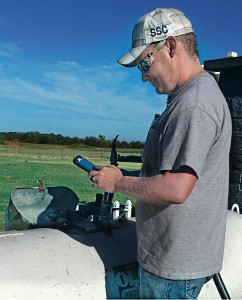Mobile devices advantageous for delivery companies

One beauty of today’s devices is they’re slim enough to fit in a driver’s pocket. Photo courtesy of Digital Dispatcher
The debate about ruggedized devices – a topic I often address as a writer and speaker – is, for all intents and purposes, over.
Which is to say, the latest smartphones and tablets are so versatile, and so resilient to withstanding the trials of rugged conditions, that they do not require ruggedized cases or expensive protection in general.
This milestone is important because it represents a technological leap as much as a financial gain for business owners in the propane delivery industry.
Let us start with a quick inventory of the benefits involving these devices, such as water resistance, voice actions for calling, texting and navigation, accelerometers, gyroscopes, thermometers, pressure sensors, iris recognition systems, Gorilla Glass screens, maps, fingerprint readers, screen magnifiers and steel and aluminum cases.
These advantages, which are standard features on the newest line of Android devices, are as intelligent as they are intuitive. Put another way, the resilience of these products is one thing – they can endure the wear and tear of use in the field – but their accessibility is something else altogether. There is no learning curve to overcome, no manual to read and memorize, no fear factor to confront, no classes to take, no tutorials to study and no seminars to attend.
I mention this point because, in an industry where there is a lot of paper and an aversion to technology that seems (but is not) hard to use, it is crucial to emphasize these devices define the principle of plug and play. These smartphones and tablets have users that span the age spectrum, from 9 to 93, so there are propane delivery companies where these devices already have homes.
Allow me, then, to return to the durability of these items for two reasons. First, the manufacture of these devices is of the highest caliber possible, at the most affordable price permissible. Along with the engineering of these products, as well as the design and testing of these pieces of hardware, we are in the midst of a renaissance in the use of state-of-the-art materials – coatings and casings that are stronger than most technophiles would have imagined just a few years prior.
It is this very fact that makes the ruggedized devices of the present look like remnants of an ancient past. It is this reason, among many others, that makes the ruggedized devices of today seem like a throwback to the modesty of a distant – and analog – yesterday.
Secondly, applications will continue to make smartphones and tablets the devices of first resort for the propane delivery business.
I issue this statement from experience, as I have the privilege of meeting with and attending events on behalf of propane delivery companies throughout the United States. I can attest, therefore, to the dual demand for devices that can take a beating, so to speak, and change things for the better.
That means these devices, powered by the right application, can streamline operations, eliminate work tickets and paper invoices, upload and store receipts, and enable dispatchers to know the whereabouts of their drivers – and the status of deliveries – thanks to an easy-to-follow brand of real-time intelligence.
That also means the devices that relay this information are slim enough to fit in a driver’s shirt pocket and strong enough to tolerate whatever day-in-the-life challenges a driver may encounter.
These advantages mark a shift worth applauding, one that is tangible and calculable. We can, in other words, feel this achievement because of the smartphones or tablets we carry, just as we can measure the rewards that an innovative application offers.
This transition makes ruggedized devices superfluous. We do not need them because there is no reason to use them. We welcome, instead, the beginning of the era of versatile devices.
Bill Stomp is the vice president of business development at Digital Dispatcher. He can be reached at 888-426-6764 or billstomp@digitaldispatcher.com.
















